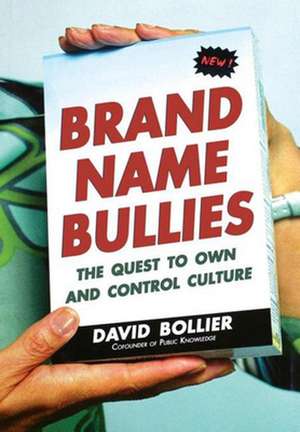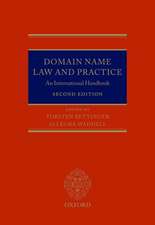Brand Name Bullies: The Quest to Own and Control Culture
Autor David Bollieren Limba Engleză Hardback – 10 feb 2005
If you want to make fun of Mickey or Barbie on your Web site, you may be hearing from some corporate lawyers. You should also think twice about calling something "fair and balanced" or publicly using Martin Luther King Jr.′s "I Have a Dream" speech. It may be illegal. Or it may be entirely legal, but the distinction doesn′t matter if you can′t afford a lawyer. More and more, corporations are grabbing and asserting rights over every idea and creation in our world, regardless of the law′s intent or the public interest. But beyond the humorous absurdity of all this, there lies a darker problem, as David Bollier shows in this important new book. Lawsuits and legal bullying clearly prevent the creation of legitimate new software, new art and music, new literature, new businesses, and worst of all, new scientific and medical research.
David Bollier (Amherst, MA) is cofounder of Public Knowledge and Senior Fellow at the Norman Lear Center, USC Annenberg School for Communication. His books include Silent Theft.
Preț: 143.49 lei
Nou
Puncte Express: 215
Preț estimativ în valută:
27.46€ • 28.56$ • 22.67£
27.46€ • 28.56$ • 22.67£
Carte disponibilă
Livrare economică 24 martie-07 aprilie
Preluare comenzi: 021 569.72.76
Specificații
ISBN-13: 9780471679271
ISBN-10: 0471679275
Pagini: 309
Dimensiuni: 165 x 237 x 27 mm
Greutate: 0.55 kg
Editura: Wiley (TP)
Locul publicării:Hoboken, United States
ISBN-10: 0471679275
Pagini: 309
Dimensiuni: 165 x 237 x 27 mm
Greutate: 0.55 kg
Editura: Wiley (TP)
Locul publicării:Hoboken, United States
Descriere
Critical Acclaim for David Bollier′s Silent Theft "Provocative. . . . always on target."
Newsweek
"This beautifully written, carefully argued book shows how little we learned from the past. Free and open resources have always been central to creativity and growth; Bollier shows how in a range of important contexts, free and open resources are being enclosed, to the benefit of the corporate class, and burden of Americans generally."
Lawrence Lessig, author of Free Culture
"Get[s] at what I think is the fundamental, primary political issue that can be the underlying value for regenerating progressive politics in our country, and that value is the common good versus private greed."
Jim Hightower, The Texas Observer
"Silent Theft raises the kinds of questions that Washington typically represses. The book broaches issues that very likely are going to drive the next big turn of the political wheel. Silent Theft confirms the brooding sense, shared by many, of a system out of control."
The Washington Monthly
"Bollier sees a relentless commercial assault on what he calls ′the commons,′ resources that should be free to all but, increasingly, are being co–opted for the corporate good."
Business 2.0
"Bollier′s handling of this complex set of issues is both deft and straightforward. The more people who read Silent Theft, the better our world."
Norman Lear
Newsweek
"This beautifully written, carefully argued book shows how little we learned from the past. Free and open resources have always been central to creativity and growth; Bollier shows how in a range of important contexts, free and open resources are being enclosed, to the benefit of the corporate class, and burden of Americans generally."
Lawrence Lessig, author of Free Culture
"Get[s] at what I think is the fundamental, primary political issue that can be the underlying value for regenerating progressive politics in our country, and that value is the common good versus private greed."
Jim Hightower, The Texas Observer
"Silent Theft raises the kinds of questions that Washington typically represses. The book broaches issues that very likely are going to drive the next big turn of the political wheel. Silent Theft confirms the brooding sense, shared by many, of a system out of control."
The Washington Monthly
"Bollier sees a relentless commercial assault on what he calls ′the commons,′ resources that should be free to all but, increasingly, are being co–opted for the corporate good."
Business 2.0
"Bollier′s handling of this complex set of issues is both deft and straightforward. The more people who read Silent Theft, the better our world."
Norman Lear
Textul de pe ultima copertă
Critical Acclaim for David Bollier′s Silent Theft "Provocative. . . . always on target."
Newsweek
"This beautifully written, carefully argued book shows how little we learned from the past. Free and open resources have always been central to creativity and growth; Bollier shows how in a range of important contexts, free and open resources are being enclosed, to the benefit of the corporate class, and burden of Americans generally."
Lawrence Lessig, author of Free Culture
"Get[s] at what I think is the fundamental, primary political issue that can be the underlying value for regenerating progressive politics in our country, and that value is the common good versus private greed."
Jim Hightower, The Texas Observer
"Silent Theft raises the kinds of questions that Washington typically represses. The book broaches issues that very likely are going to drive the next big turn of the political wheel. Silent Theft confirms the brooding sense, shared by many, of a system out of control."
The Washington Monthly
"Bollier sees a relentless commercial assault on what he calls ′the commons,′ resources that should be free to all but, increasingly, are being co–opted for the corporate good."
Business 2.0
"Bollier′s handling of this complex set of issues is both deft and straightforward. The more people who read Silent Theft, the better our world."
Norman Lear
Newsweek
"This beautifully written, carefully argued book shows how little we learned from the past. Free and open resources have always been central to creativity and growth; Bollier shows how in a range of important contexts, free and open resources are being enclosed, to the benefit of the corporate class, and burden of Americans generally."
Lawrence Lessig, author of Free Culture
"Get[s] at what I think is the fundamental, primary political issue that can be the underlying value for regenerating progressive politics in our country, and that value is the common good versus private greed."
Jim Hightower, The Texas Observer
"Silent Theft raises the kinds of questions that Washington typically represses. The book broaches issues that very likely are going to drive the next big turn of the political wheel. Silent Theft confirms the brooding sense, shared by many, of a system out of control."
The Washington Monthly
"Bollier sees a relentless commercial assault on what he calls ′the commons,′ resources that should be free to all but, increasingly, are being co–opted for the corporate good."
Business 2.0
"Bollier′s handling of this complex set of issues is both deft and straightforward. The more people who read Silent Theft, the better our world."
Norman Lear
Cuprins
Acknowledgments. Introduction.
PART ONE: Art and Culture: Use Only as Directed.
1. The Crusade to Lock Up Music.
2. Creativity and Captive Images.
3. Appropriating the People s Culture.
PART TWO: Trademarking Public Life.
4. Trademark Owners Whine, No Making Fun of Me! .
5. The Corporate Privatization of Words.
6. Property Rights in Public Image.
PART THREE: The Copyright Wars against an Open Society.
7. The Theft of the Public Domain.
8. Stifling Public Dialogue through Copyright.
9. The DMCA s Attacks on Free Speech.
PART FOUR: Absurd New Frontiers of Control.
10. The Quest for Perfect Control.
11. Intellectual Property Goes Over the Top.
12. Just Kidding or Dead Serious?
Conclusion: Reclaiming the Cultural Commons.
Notes.
Bibliography.
Index.
PART ONE: Art and Culture: Use Only as Directed.
1. The Crusade to Lock Up Music.
2. Creativity and Captive Images.
3. Appropriating the People s Culture.
PART TWO: Trademarking Public Life.
4. Trademark Owners Whine, No Making Fun of Me! .
5. The Corporate Privatization of Words.
6. Property Rights in Public Image.
PART THREE: The Copyright Wars against an Open Society.
7. The Theft of the Public Domain.
8. Stifling Public Dialogue through Copyright.
9. The DMCA s Attacks on Free Speech.
PART FOUR: Absurd New Frontiers of Control.
10. The Quest for Perfect Control.
11. Intellectual Property Goes Over the Top.
12. Just Kidding or Dead Serious?
Conclusion: Reclaiming the Cultural Commons.
Notes.
Bibliography.
Index.
Notă biografică
DAVID BOLLIER has worked for twenty years as a journalist, activist, and public policy analyst. He is cofounder of Public Knowledge, a public interest advocacy organization dedicated to defending the information commons, as well as Senior Fellow at the Norman Lear Center, USC Annenberg School for Communication. His previous book was Silent Theft: The Private Plunder of Our Common Wealth.





